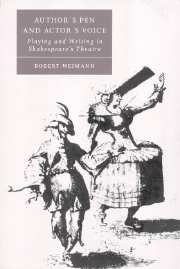Book contents
- Frontmatter
- Contents
- Preface
- Introduction: conjunctures and concepts
- 1 Performance and authority in Hamlet (1603)
- 2 A new agenda for authority
- 3 Pen and voice: versions of doubleness
- 4 Playing with a difference
- 5 Histories in Elizabethan performance
- 6 Hamlet and the purposes of playing
- 7 Space (in)dividable: locus and platea revisited
- 8 Shakespeare's endings: commodious thresholds
- Afterword: thresholds forever after
- Notes
- List of works cited
- Index
5 - Histories in Elizabethan performance
Published online by Cambridge University Press: 22 September 2009
- Frontmatter
- Contents
- Preface
- Introduction: conjunctures and concepts
- 1 Performance and authority in Hamlet (1603)
- 2 A new agenda for authority
- 3 Pen and voice: versions of doubleness
- 4 Playing with a difference
- 5 Histories in Elizabethan performance
- 6 Hamlet and the purposes of playing
- 7 Space (in)dividable: locus and platea revisited
- 8 Shakespeare's endings: commodious thresholds
- Afterword: thresholds forever after
- Notes
- List of works cited
- Index
Summary
To account for both the strength and the decline of the performant function is diffcult without viewing the larger spectrum of Elizabethan performance practices, and the actual diversity of cultural needs and interests behind them, in historical perspective. The performant function, which was one purpose of playing among others, was of necessity one that, in Polonius' terms, enjoyed more “liberty” than a mode of acting that followed “the law of writ.” Hence, the presentational purpose of playing could assume a strong nonscriptural dimension that, however, found itself contested and largely intercepted by an increasingly dominant and ultimately more exclusive regime of literacy in dramatic representations. Any historical narrative of the genealogy of the Elizabethan theatre must come to terms with the modes, the results, and the space of this contestation. Theatre history is confronted with the need to account for the ways and means and of course the circumstances in which the language of dramatic characterization and the “mirror” of representational meaning came more and more to dominate performance practices.
At the present state of our knowledge, it seems premature to undertake anything like an exhaustive account of the complex field of socio-cultural forces, interests and circumstances implicated in this process. Rather than attempting an impossible task, I shall content myself with exploring some of the early signs of change and the incipient results of differentiation between the ‘unworthy’ stage practice of common players and the textdominated theatre of the excellent actor and perfect impersonator.
- Type
- Chapter
- Information
- Author's Pen and Actor's VoicePlaying and Writing in Shakespeare's Theatre, pp. 109 - 150Publisher: Cambridge University PressPrint publication year: 2000
- 1
- Cited by



